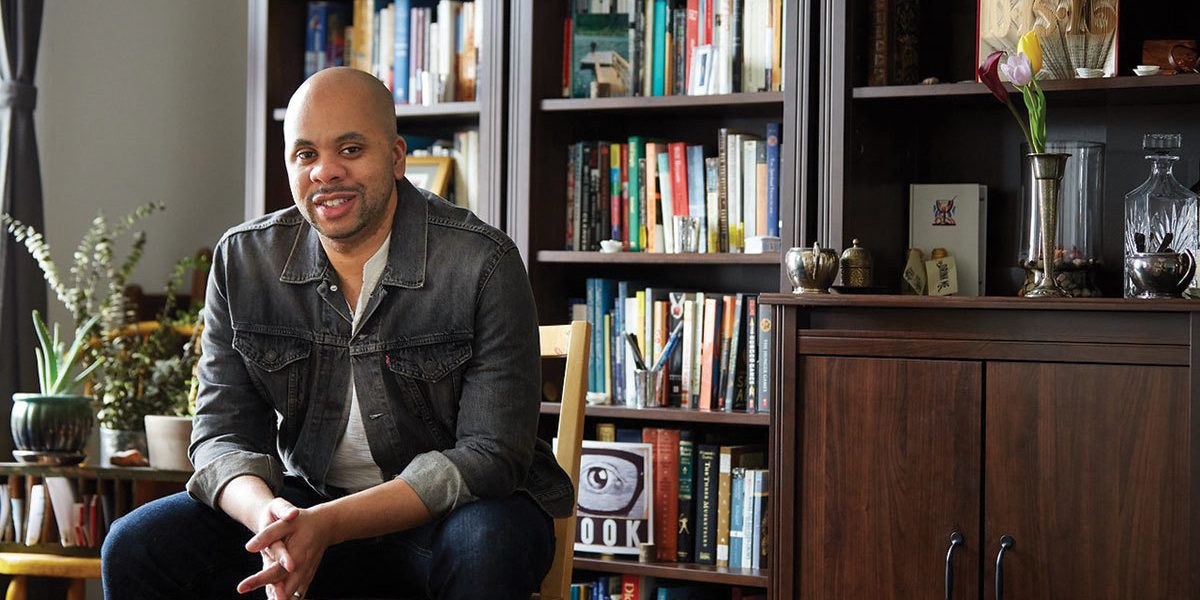Arts & Culture
Q&A with R. Eric Thomas
Catching up with the Baltimore native, Park School alum, and Elle.com columnist.
Have you ever wondered about the strategy behind Beyonce’s pregnancy photoshoot or
why you really shouldn’t mess with journalist April Ryan? R. Eric Thomas is here to help. His humor column at Elle.com, and contributions to sites like Man Repeller and StyleCaster, have been going viral and lightening up your Facebook feed since last July. We talked to Eric about growing up in Baltimore and how he got internet famous.
What was growing up in Baltimore like for you?
I grew up in the Upton area of downtown Baltimore. My father is the executive director of the Baltimore Public Market Corporation and before that he was the assistant general manager of Lexington Market. What I love about Baltimore is how each neighborhood is like a different cultural experience.
How was your experience at The Park School?
I loved that I got to experience a completely different world. I grew up downtown in the city and went to church at Pimlico, but then when I went to school I was out in 90 acres of woods and we got to ride horses and walk along streams and it was an extraordinary educational experience for me as well as an extraordinary cultural experience. It really made me who I am. After Park, I went to Columbia in New York and then transferred to UMBC to study playwriting.
How did you get involved with Elle.com?
Last June, I posted a picture of Barack Obama and Justin Trudeau and the president of Mexico on Facebook and wrote a little riff about it because it looked like a movie poster. They looked like the all male cast of Sex In The City. It got shared about 70,000 times on Facebook and it happened to come across my editor’s desk and she asked me if I would want to do this every day and I said yes. My editor at Elle.com, Leah Chernikoff, says that she wants the site to be like the best brunch conversations—politics and fashion and pop culture and more all rolled into one. I think that my voice is able to add a little intersectional comedy to the conversation.
Did you always think you would be writing a humor column?
I went to college thinking I was going to be the next Toni Morrison. I just wanted to rewrite Beloved for the rest of my life, but apparently that position has been filled. Playwriting is my first love. My first play was produced in Baltimore. And then, when I moved to Philadelphia, I got into storytelling and got involved with an organization very similar to Stoop Storytelling, which you have in Baltimore. That is really where I developed a stronger comedic voice, which led to posting weird things on the internet, which led to writing funny things about the news every day.
How have you cultivated your sense of humor?
I’m the least funny member of my family so, of course, I am the one who gets paid to make jokes. I come from a line of super intelligent, very witty people and I learned how to be funny by sitting around our dinner table. It was competitive in that way that dressing rooms at comedy clubs are competitive—there’s no punishment or mockery for not being funny, but it’s so rewarding to make other funny people laugh. At my wedding, my brothers and parents gave the most hilarious, heartwarming speeches and now everyone is obsessed with them. All my producer friends are trying to book my family for shows. This is terrible.
What do you believe your column’s purpose is?
I think it provides a respite for people who are exhausted by the news, but still want to remain aware. My column doesn’t ignore the world that we live in but does provide the opportunity to laugh. I think that’s important. I know I’m not curing cancer, but I know firsthand how draining it can be to constantly be pushing back against oppression or injustice. I see the column as sort of like the meal you go to after the march, that space where you can relax for a minute with people who also want to see a better world, and tell stories and jokes—sometimes. Sometimes the column is just me finding reasons to post videos of Idris Elba working out. That’s important, too.
How do you think celebrity has changed in recent years?
As with the news cycle, many aspects of celebrity have become 24-hour affairs. It’s possible to never be off as a celebrity. And there’s a deeper expectation of access. Celebs are supposed to Snap and Insta and Tweet and also put out new work and show up to talk shows. It’s a lot. I mean, they get paid a lot so I’m not super sad about it, but it’s also just so much. Sometimes you want to take a week where everyone gets a vacation from being in the present. We can all sit on the beach and read a book and not worry about what our favorite stars are doing and, in return, they can sit around and be boring and maybe not post a Snapchat about their breakfast. That’s my dream: to not know what celebrities are eating for breakfast.
Why does popular culture resonate with people so much right now?
I think pop culture has always been aspirational and there are so many barriers being set up in our culture right now that, for a lot of people, aspiration is all they have. I don’t know if we should be seeing pop culture as a model for living, but it is something that reaches across divisions and connects us. That’s significant. I think pop culture helps us to know that we’re not alone in the way we feel, the things we think, what we want, and what makes us laugh.
